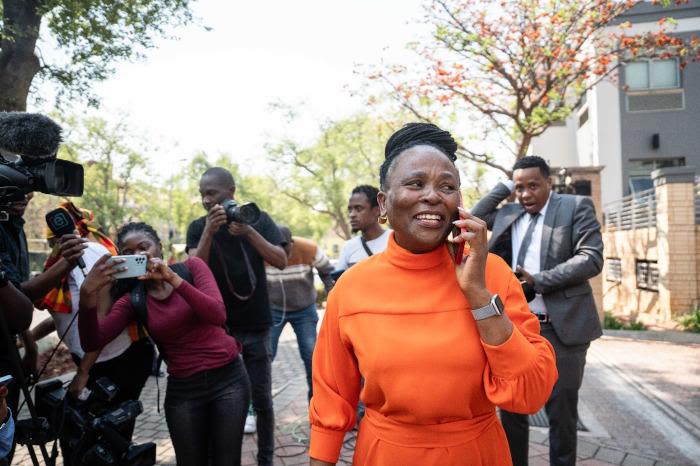Suspended Public Protector Busisiwe Mkhwebane outside her office Photo Jacques Nelles/Eyewitness News/702
South Africa – The spotlight has once again turned to the suspended Public Protector, Busisiwe Mkhwebane, as she was recently barred from entering her office a year after her suspension by President Cyril Ramaphosa. This development comes just days before Members of Parliament (MPs) are scheduled to vote on Mkhwebane’s impeachment and the election of a new Public Protector which the African Transformation Movement (ATM) proposed should be a secret ballot.
In a statement released ahead of her intended return to the office, the spokesperson for the Public Protector, Ndili Msoki, affirmed that Mkhwebane’s suspension remains in effect and she is unable to resume her duties until the president provides guidance to the contrary. Mkhwebane believed that the inquiry had reached its end, making it reasonable for her to return to work. Some argued that she should have awaited the inquiry’s findings before attempting to resume her duties while Zama Ntshona, National Spokesperson for ATM, believes Mkkhwebane did as she was told and followed due process.
“The issue was we do not want you to interfere with anything whilst the process [the inquiry] is ongoing. Now the process has been finalised and there is no determination yet and there is no communication also of what should actually be the next step … There’s going to be an ongoing debate. Even from inception on this matter, society has been divided. Society has been asking on one end that why would an individual with a case finalisation that is over 95% with two consecutive clean audits be the one who is subjected to a fitness to hold office? Whilst the others are saying the seven cases out of 56 000 were enough to actually remove her. I am not surprised where we are right now.”
Ntshona believes this is an active effort to remove a Public Protector that ATM believes does not bend a knee to the president and his party’s antics.
Prolonged inquiry and delay tactics
One significant point of contention is the prolonged nature of the inquiry, with numerous postponements and delays. Some have suggested that these delays were deliberate tactics employed by the suspended Public Protector’s legal team to secure a financial benefit. On the other hand, the matter could have been delayed by the ruling party in an effort to ensure Mkhwebane does not get a chance to resume her work and “interfere in cases they do not want her to interfere with”.
“One of those key cases was the Phala Phala matter. She needed to be kept out of office because they knew if she was going to be in office she was going to find, in accordance with the section 89 independent committee which was chaired by a former Chief Justice, that said there was prima facie evidence.”
Of the seven cases that are being used against the Public Protector, the majority of them include the president or those closest to them, said Ntshona.
SMread: Research Professor Demands Accountability for 1971 Junior Wimbledon Exclusion
ATM requesting a secret ballot
Vuyo Zungula, president of the ATM, has requested for a secret ballot concerning the report of the Section 194 Committee on the Public Protector. Ntshona argued that it was essential to safeguard the integrity of the parliamentary process, allowing members to vote according to their conscience. This can only be done through a secret ballot.
“Now it is important that we protect the Integrity of the process and of the members of parliament. We have seen with the previous vote on the section 89 report that people were told if you do not vote in a particular way you are going to lose your livelihood. There are people in Parliament who received SMS that said if you vote with the ATM on this matter it will be your last day on earth and cases have been opened with the police.”
Ntshona made mention of various party presidents like “Zungula, Mzwanele Nyhontso, President of the PAC and Bantu Holomisa, President of the UDM, all received death threats. It is because of this volatility that exists within parliament, MP’s may feel they need to vote a certain even if it is not what they wish to do. The secret ballot will allow politicians to vote freely without the fear of retribution.
International support and legal action
Mkhwebane has hinted at seeking international support and legal action if the inquiry’s findings are unfavourable. This move has sparked discussions about whether it is appropriate to involve international entities in a South African-based matter. However, the ATM supports her decision in exploring every avenue possible in order to “redeem herself”.
“We must start by saying she has every right as a citizen of this country, an employee of the government to explore every avenue possible to redeem herself. We can’t run away from the fact that she is now labelled as incompetent. She is labelled as an individual who does not understand the law, as a vindictive individual who is used by a faction. She may not even find a place of employment because of how she was lynched for doing what is right.”
The saga of the Public Protector continues to evolve, leaving South Africans divided on various aspects of the issue. As we await the conclusion of the inquiry and potential legal actions, the debate surrounding this case underscores the importance of transparency, accountability, and the rule of law in the country. The outcome of this complex situation will undoubtedly have far-reaching consequences for South Africa’s political landscape and governance. On September 12, MP’s will vote on whether to impeach the Public Protector and should the vote pass, they will also vote on who the next Public Protector will be.
